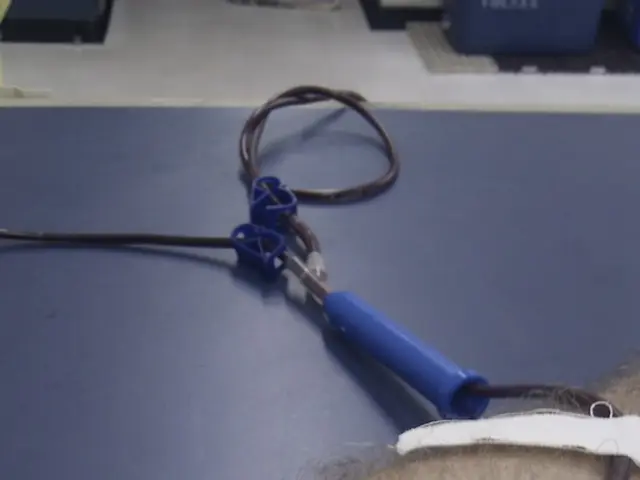Dissipated Muscle Control Due to Marijuana Consumption: An Explanation
Chillin' Out the Central Nervous System: Marijuana's Tangled Web of Benefits and Risks
For years, marijuana has been synonymous with a good time, but its impact on the body, especially the muscles and motor control, has been shrouded in mystery. While some users report slurred speech and muscle weakness, others, particularly those battling neurodegenerative diseases like MS, swear by its benefits. Let's dive into the mind-bending world of marijuana, motor neurons, and how a substance once labeled recreational is being reimagined as a possible therapy.
Researchers from the University of Cadiz in Spain have recently unveiled a groundbreaking study published in Neuropharmacology. Their findings reveal marijuana’s direct influence on motor neurons, shedding new light on how the drug alters muscle movement. In essence, marijuana cooks up a buzz by interfering with the communication between neurons, dialing down the strength of muscle contractions.
At first glance, suppressing communication between motor neurons might seem like a recipe for disaster. But here's where things get interesting-this very process could explain why marijuana is a game-changer for those suffering from conditions that cause muscle hyperactivity.
The Twist: Marijuana's Two-Faced Nature
To understand marijuana's impact on the nervous system, a team led by Bernardo Moreno from the NeuroDegeneration and NeuroRepair Group experimented on lab mice, focusing on the motor neurons that control the tongue. They dishonored these neurons with synthetic analogues of marijuana's psychoactive compounds and observed the repercussions on nerve cells. The results? The compounds slow down the transmission of information between motor neurons, weakening muscle contractions.
Moreno breaks it down: "The motor neuron-that is, the one that gives the order to the muscle to contract-sees its activity reduced, which, as a consequence, would weaken the strength of the muscle contraction."
For the average individual, weakening muscle contractions may seem like a bad thing. However, for people living with diseases like MS, ALS, or epilepsy, this effect could actually offer respite.
When Weakness is a Blessing
Most of us are accustomed to thinking that weakening muscle contractions is a negative. But in certain circumstances, this weakness can provide relief.
For individuals battling MS, ALS, or epilepsy, muscle hyperactivity-or excessive, uncontrollable muscle contractions-can lead to pain, spasms, and difficulty controlling movement. Marijuana's effects, then, take on a therapeutic role.
Moreno's team suggests that marijuana's ability to suppress motor neuron activity may ease symptoms for those experiencing the torment of these conditions. Here's how:
- In patients with MS, muscles often contract involuntarily due to damaged, misfiring nerves. By dampening the activity of motor neurons, marijuana may help reduce these spasms.
- In ALS, the disease causes neurons to send uncontrolled signals, causing muscle rigidity and cramping. Marijuana's capacity to slow these signals could bring relief.
- For epilepsy patients, seizures are often linked to overactive neural activity. Marijuana's calming effect on neurons may help control these episodes.
This suggests that what might be considered an unwanted side effect for a healthy user-such as difficulty speaking-could offer solace for those wrestling with neurological disorders.
Marijuana's Dance with the Brain: More Than Just Motor Neurons
This isn't the only study uncovering marijuana's secret closeness with the nervous system. A separate study from last year investigated how long-term marijuana use affects brain connectivity. The research revealed that heavy marijuana users tend to have a smaller orbitofrontal cortex, a region of the brain responsible for decision-making. However, their brains compensate for this loss by increasing connectivity in other areas, essentially rewiring themselves to maintain function. This compensation was most pronounced in users who started young, indicating that marijuana may have an impact on brain plasticity over time.
This raises the question: Could long-term marijuana use reshape neural pathways in a way that benefits individuals with neurodegenerative diseases?
The Broader Picture: Could Marijuana Effectively Be a Targeted Treatment?
Although marijuana is still considered debatable in the medical world, research like this could pave the way for more targeted therapies. If scientists can isolate the compounds responsible for reducing motor neuron activity, they could potentially develop new drugs that offer the benefits of marijuana without the psychoactive effects.
Moreno's study is only the beginning of a deeper exploration of the complex relationship between marijuana and the nervous system. It suggests that:
- Marijuana doesn't just affect mood and cognition-it influences motor control directly.
- The same mechanism that makes speech or movement sluggish in some users could actually aid individuals with neurological conditions.
- Potential future therapies could harness this effect to develop better treatments for MS, ALS, and epilepsy.
As Moreno himself notes: "In pathological processes associated with muscular hyperactivity, the reduction in motor neuron activity induced by cannabis could lead to symptom improvement."
For now, marijuana remains a double-edged sword-offering both side effects and possibilities. But as research continues, we may discover that its impact on the nervous system is far more advantageous than we ever imagined.
Sources:
- Neuropharmacology, University of Cadiz, BBC, The Washington Post
Enrichment Data
The impact of marijuana and its constituents—particularly THC (tetrahydrocannabinol) and CBD (cannabidiol)—on motor neurons and neurodegenerative diseases like multiple sclerosis (MS), amyotrophic lateral sclerosis (ALS), and epilepsy is a thriving area of research, with emerging evidence pointing towards both potential benefits and concerns.
Impact on Motor Neurons
- Direct Effects on Neuronal Function:
- THC typically acts by binding to cannabinoid receptors within the brain, modifying neuronal activity and brain chemistry.
- CBD interacts with multiple ion channels (potassium, sodium, calcium) and receptors, affecting neuronal excitability and communication.
- Potential Risks:
- Studies suggest that disrupting these ionic channels may have long-term effects on neuronal networks, including motor neurons. Fetal CBD exposure has been shown to reduce excitability in the prefrontal cortex, which may have implications for neuronal development and function.
Neuroprotective Properties
- Both CBD and THC have demonstrated neuroprotective effects by reducing glutamate-induced neurotoxicity in neuronal cultures, independent of cannabinoid receptor activation.
- Antioxidant Effects:
- Both compounds are effective antioxidants, protecting neurons from oxidative stress, which is implicated in several neurodegenerative diseases.
Effects on Neurodegenerative Diseases
Multiple Sclerosis (MS)
- Marijuana has been studied for its ability to alleviate symptoms of MS, such as muscle spasticity, pain, and sleep disturbances, primarily due to effects on neuronal signaling and inflammation.
- Neuroprotection:
- The antioxidant and anti-inflammatory properties of cannabinoids may indirectly offer neuroprotection, though direct evidence of slowing disease progression is limited.
Amyotrophic Lateral Sclerosis (ALS)
- Potential Benefits:
- Cannabinoids may reduce glutamate toxicity and provide neuroprotection, potentially slowing neuron loss in ALS models.
- Human Evidence:
- While preclinical studies are promising, clinical data in ALS patients are limited, and the results are mixed.
Epilepsy
- Seizure Reduction:
- CBD is FDA-approved for certain forms of epilepsy due to its capacity to reduce seizure frequency and severity.
- Mechanisms:
- CBD’s effects on ion channels and neurotransmitter release help stabilize neuronal networks, making it useful in some refractory epilepsy syndromes.
Summary Table
| Disease | Impact of Marijuana/Cannabinoids | Mechanism/Evidence Summary ||-----------------|----------------------------------|------------------------------------------------------------------|| MS | May reduce spasticity, pain | Modulates neuronal signaling; anti-inflammatory[4][5] || ALS | Potential neuroprotection | Reduces glutamate toxicity; preclinical benefits[5] || Epilepsy | FDA-approved CBD for some types | Stabilizes neuronal excitability[3] |
Key Points
- Cannabinoids can modulate motor neuron activity through effects on ion channels and neurotransmitter systems.
- They show neuroprotective and antioxidant effects that may benefit individuals with neurodegenerative diseases.
- In MS, cannabis is used for symptom management; in epilepsy, CBD is used to reduce seizures.
- More research is needed to fully understand long-term effects and benefits in ALS and other neurodegenerative conditions.
In summary, marijuana and its components can impact motor neurons through various mechanisms, and they may offer symptomatic relief or neuroprotection in MS, ALS, and epilepsy. However, the extent of their therapeutic potential and safety profile requires further investigation.
- The study in Neuropharmacology from the University of Cadiz discovered that marijuana directly impacts motor neurons, inhibiting the strength of muscle contractions through interfering with neuron communication.
- The team led by Bernardo Moreno found that synthetic analogues of marijuana's psychoactive compounds slow down information transmission between motor neurons, weakening muscle contractions, which could provide relief for those with diseases like MS, ALS, or epilepsy.
- Research has revealed that heavy marijuana users over time may have a smaller orbitofrontal cortex, but their brains compensate by increasing connectivity in other areas, implying that long-term marijuana use could potentially reshape neural pathways in a way that benefits individuals with neurodegenerative diseases.
- CBD, a constituent of marijuana, has neuroprotective properties, reducing glutamate-induced neurotoxicity in neuronal cultures, independent of cannabinoid receptor activation, offering potential benefits in neurodegenerative diseases like ALS and MS.








